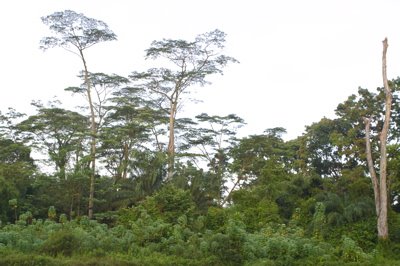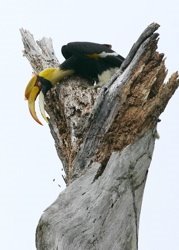Life around a rotting tree trunk 1: Introduction
 The location: A small piece of wasteland around Eng Neo bordering the Pan Island Expressway on one side and a sprawling low-rise housing apartments on the other.
The location: A small piece of wasteland around Eng Neo bordering the Pan Island Expressway on one side and a sprawling low-rise housing apartments on the other.The vegetation: A young secondary growth dominated by clumps of palms and bamboos overgrown with mainly exotic weeds. A few scattered emergent old albizia (Paraserianthes falcataria) trees.
The cast of characters: Hill Myna (Gracula religiosa), Javan Myna (Acridotheres javanicus), Collared Kingfisher (Todiramphus chloris), Dollarbird (Eurystomus orientalis), Greater Racket-tailed Drongo (Dicrurus paradisus) and Long-tailed Parakeet (Psittacula longicauda), Rainbow Lorikeet (Trichoglossus haematodus), among others.
The attraction of the area: The presence of a few tall and old albizia trees. These trees provide excellent perches for birds, perches where they can get a bird’s eye view of the surrounding area. These old trees, as well as at least one dead and semi-rotting tree trunk are full of cavities, natural as well as otherwise, that many of these birds nest in. Also, the overgrown vegetation is rich in invertebrate fauna, besides providing fruits, like melastoma (Melastome malabathricum) and white-leafed fig (Ficus grossularioides).
The focal point: A rotting albizia trunk that is infested with termites. Half way up the trunk is a number of cavities, with more at the top.


This rotting trunk is the focal point of many birds during the early morning and late evening. A pair of Collared Kingfishers was nesting in the cavity around the centre of the trunk while the upper cavities were inhabited, at different times, by Long-tailed Parakeets and Dollarbirds, among others.
With these different species congregating around this single rotting tree trunk, it is inevitable that conflicts will occur. And occurred they did. In subsequent postings we will bring to you the various dramas that unfolded in this very interesting area, small as it is, in urban Singapore.
 PS: This is also the area where a pair of Great (Buceros bicronis) and Rhinoceros Hornbills (B. rhinoceros) was prospecting a potential nesting hole in a living albizia tree. But that is a story already told.
PS: This is also the area where a pair of Great (Buceros bicronis) and Rhinoceros Hornbills (B. rhinoceros) was prospecting a potential nesting hole in a living albizia tree. But that is a story already told.Thanks to Ng Bee Choo and Eng Tow who introduced me to the site. Text and images by YC, except Great Hornbill image by Meng and Melinda Chan.
Labels: Interspecific



0 Comments:
Post a Comment
<< Home